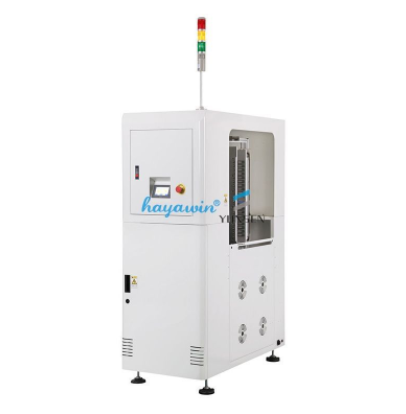SMT PCB Buffer vs. Conveyors: Which Is Better for Your Assembly Line?
In the world of surface mount technology (SMT) PCB assembly, efficiency and throughput are critical. To achieve streamlined and productive assembly lines, manufacturers often face the decision of choosing between SMT PCB buffers and conveyors. Both serve important roles, but the choice between them depends on specific production needs and objectives.
Advantages:
1.Flexibility: SMT PCB buffers are highly flexible and can adapt to changes in production volume. They provide a buffer between various stages of assembly, allowing for temporary storage of PCBs.
2.Minimized Downtime: Buffers help reduce downtime between different stages of assembly, ensuring that one stage can continue working while the next one prepares to receive PCBs.
3.Error Mitigation: They can help prevent errors by allowing operators to inspect PCBs before they move to the next stage, reducing the chances of defects progressing further down the line.
4.High-Mix, Low-Volume Production: Buffers are particularly beneficial in high-mix, low-volume production environments, where frequent product changeovers occur.
Use Cases:
1.Multi-Stage Assembly: SMT PCB buffers are ideal for multi-stage assembly lines where PCBs go through various processes like soldering, inspection, and testing.
2.Variable Production Volumes: They are useful when production volumes vary and need to be balanced.
3.Error-Prone Environments: In situations where quality control is crucial, SMT PCB buffers provide opportunities for inspection and rework.
Conveyors:
Advantages:
1.Continuous Flow: Conveyors offer a continuous and linear flow, which is perfect for high-volume, single-product assembly lines.
2.Reduced Handling: PCBs on conveyors require less manual handling, minimizing the risk of damage or contamination.
3.Speed: In high-speed assembly, conveyors excel, ensuring rapid movement of PCBs from one station to another.
4.Space Efficiency: Conveyors are often more space-efficient than buffers, making them suitable for compact production areas.
Use Cases:
1.High-Volume Production: Conveyors are well-suited for high-volume production lines with minimal product variation.
2.High-Speed Assembly: They are essential in assembly lines where speed is a top priority, such as in the production of consumer electronics.
3.Space-Constrained Facilities: Conveyors are optimal for facilities with limited floor space.
The choice between SMT PCB buffers and conveyors depends on the specific needs and goals of your assembly line. Buffers offer flexibility, error mitigation, and are excellent for high-mix, low-volume production. Conveyors provide continuous flow, high-speed operation, and are best for high-volume, single-product lines.
In many cases, a combination of both may be the most practical solution. Manufacturers often use buffers strategically within conveyor-based assembly lines to provide flexibility, error correction, and the ability to adapt to variable production volumes. Ultimately, the decision should align with your production requirements and your commitment to delivering high-quality SMT PCB assemblies efficiently.
176
0
0



Comments
All Comments (0)